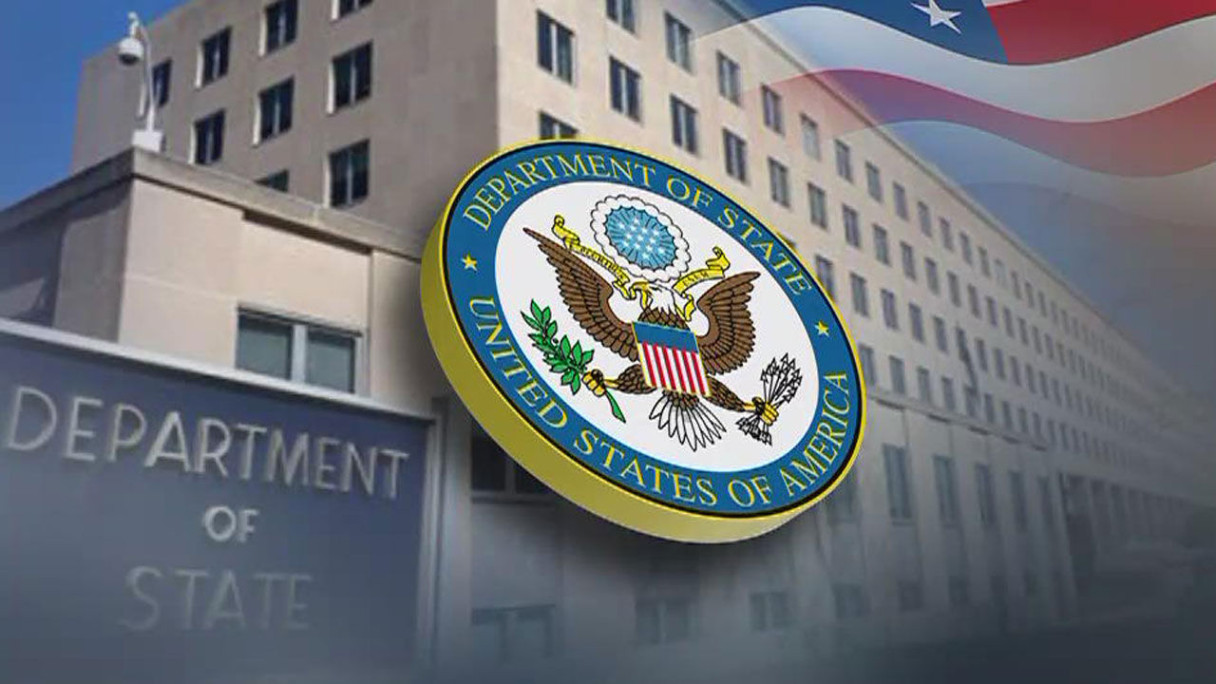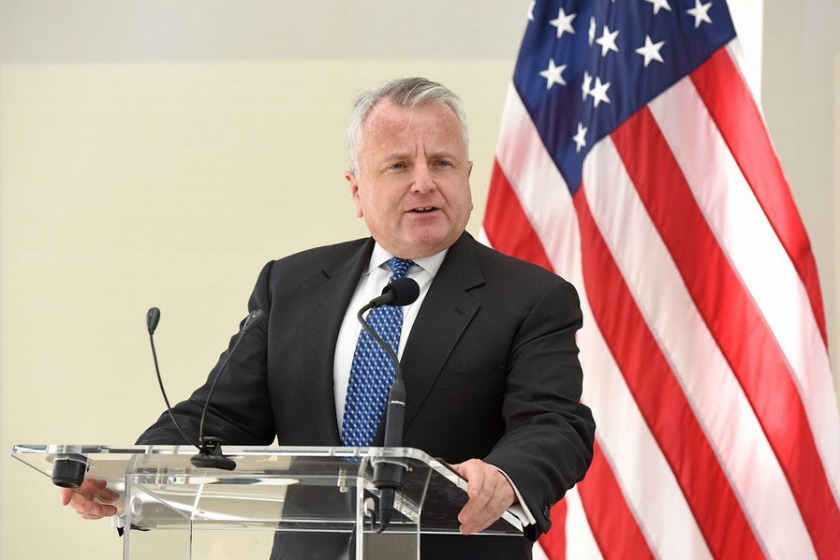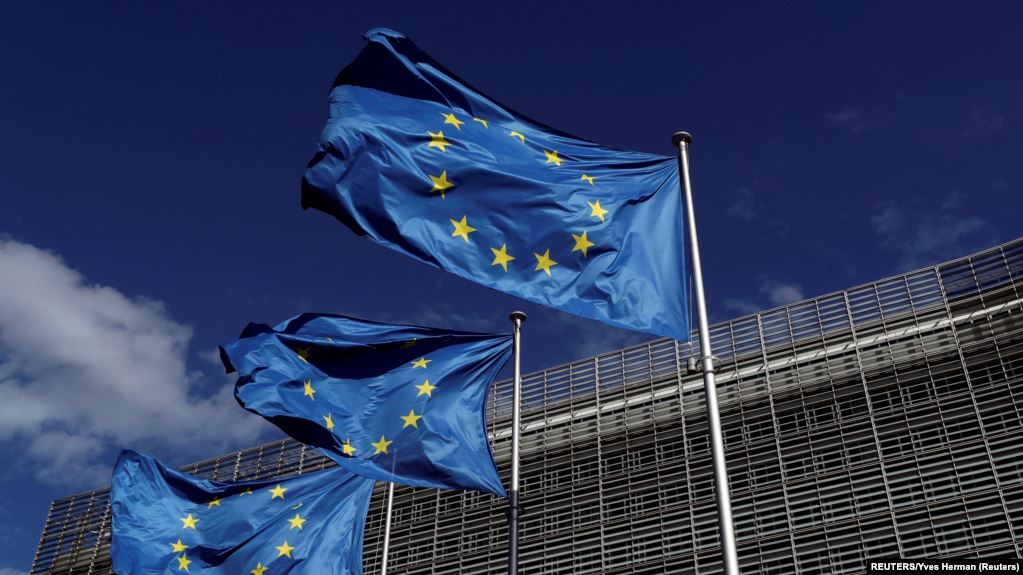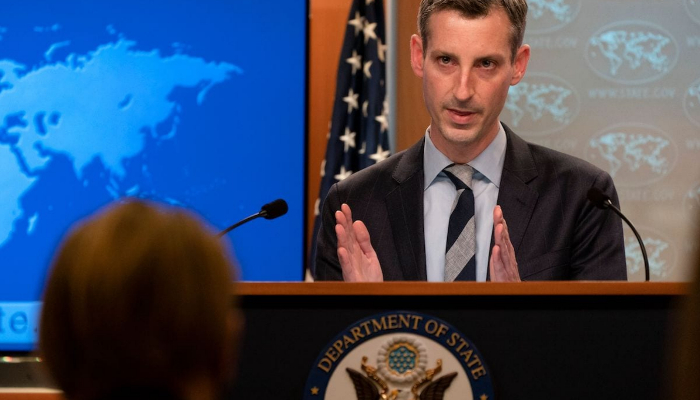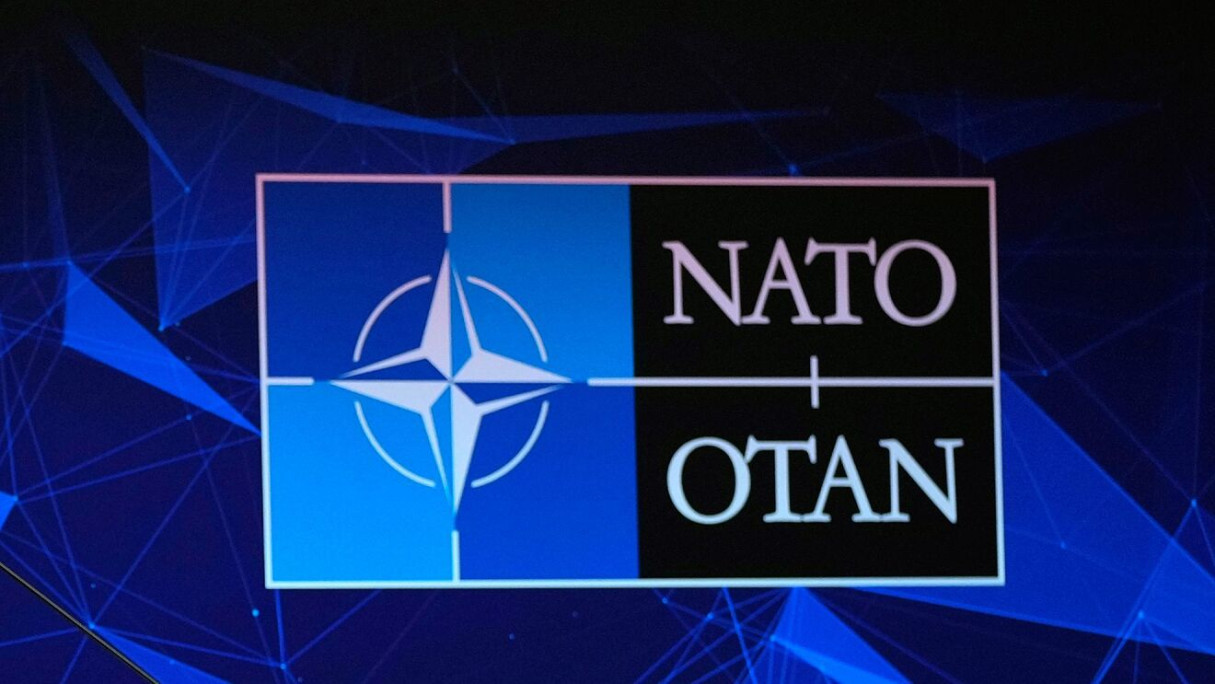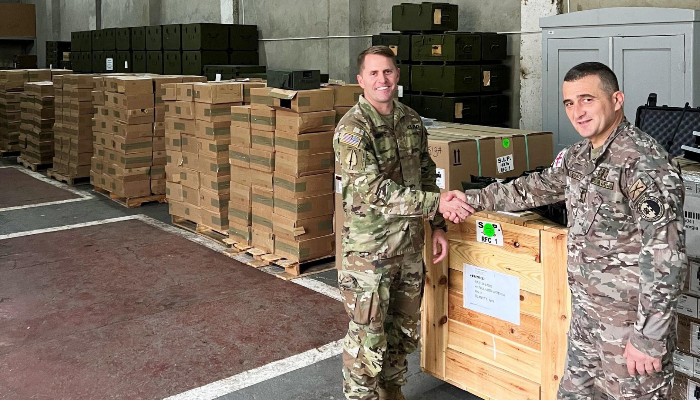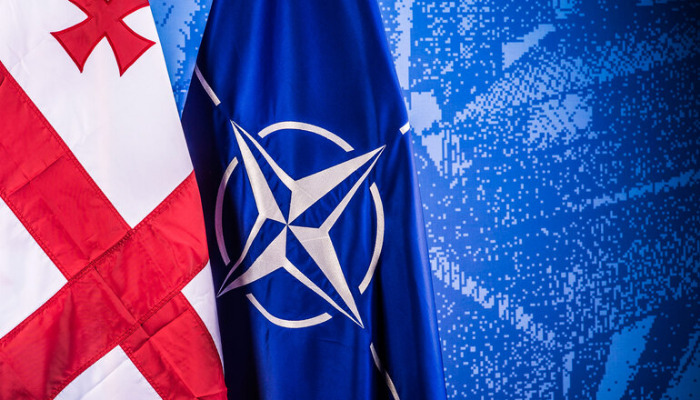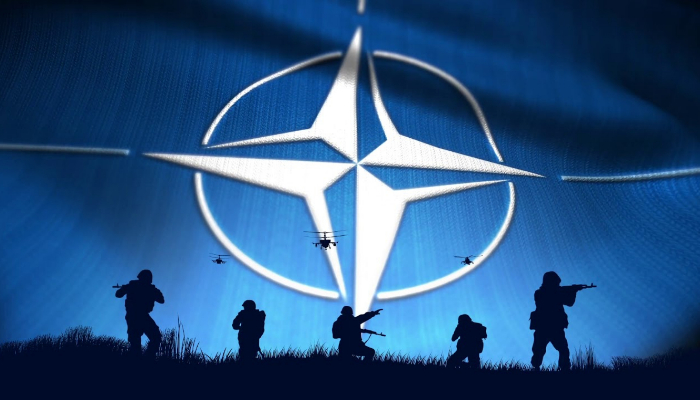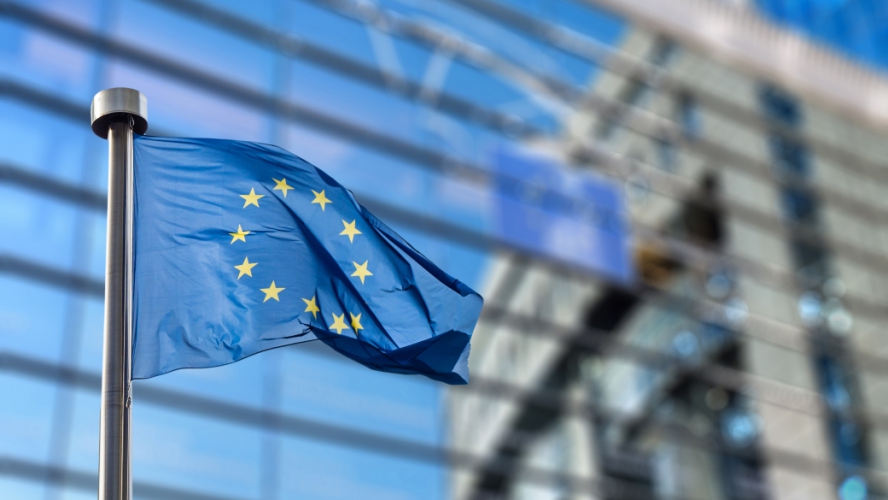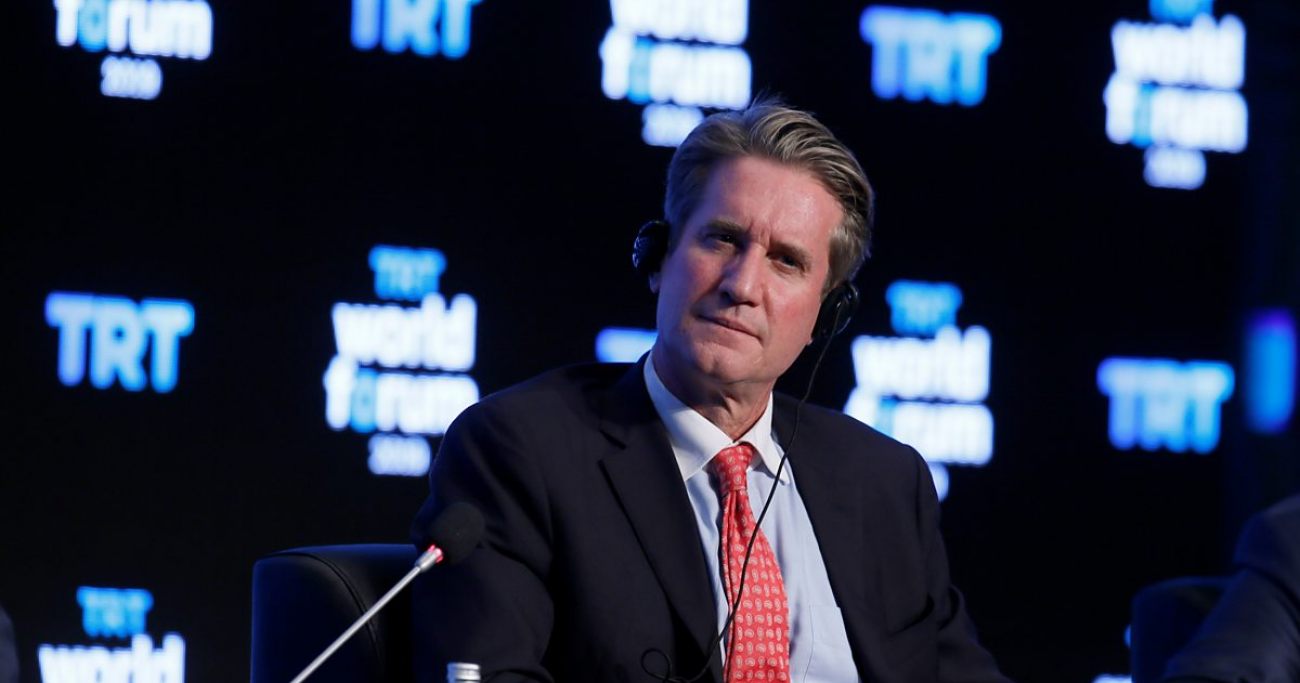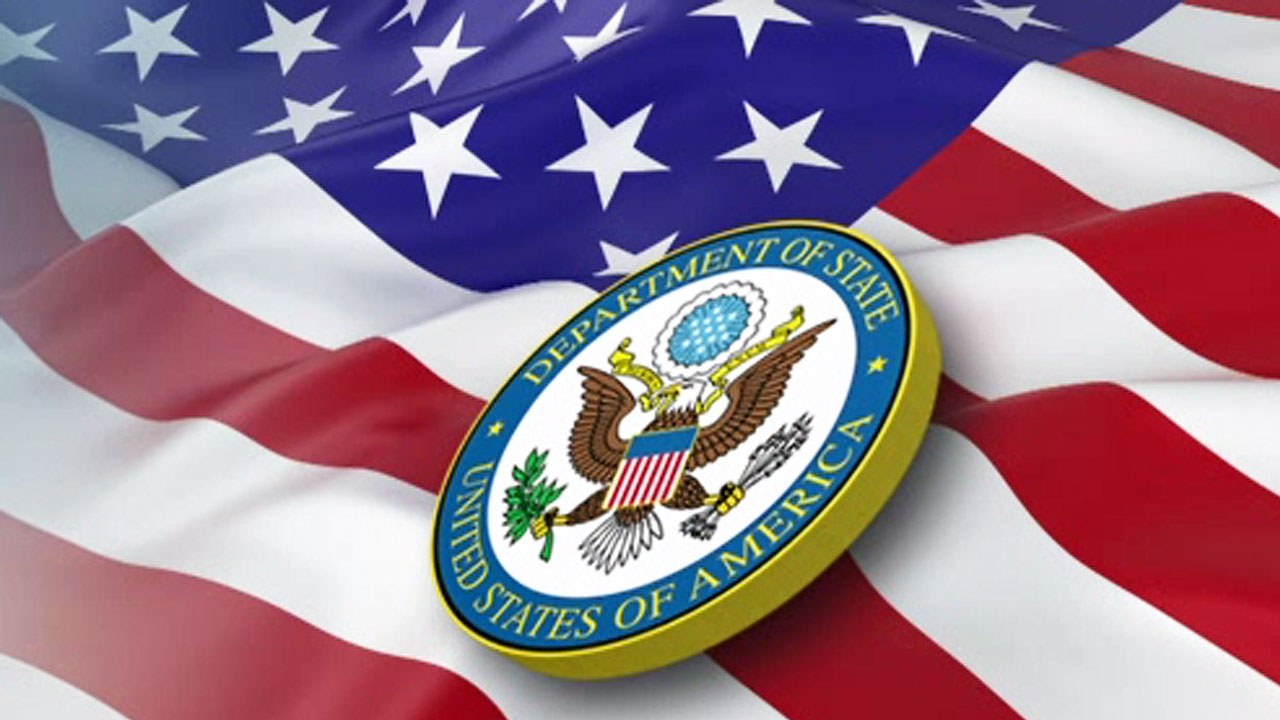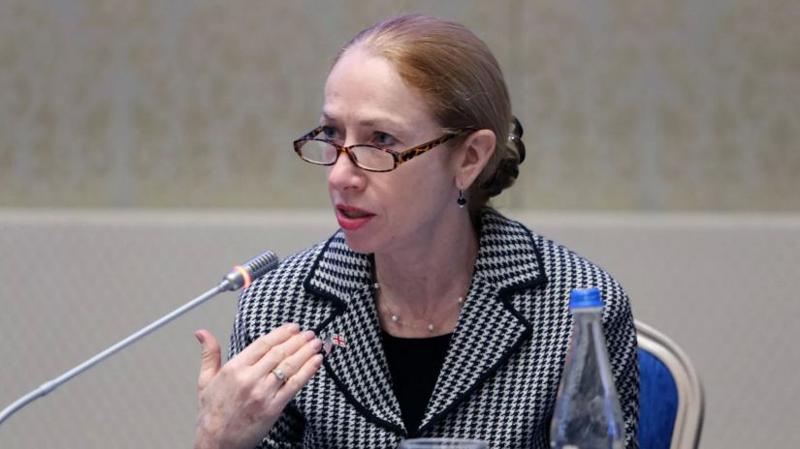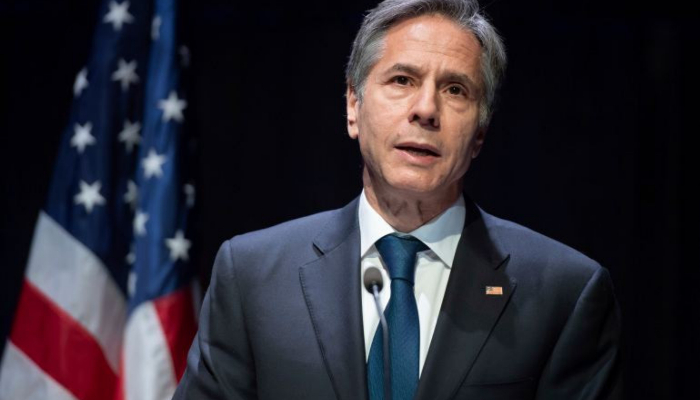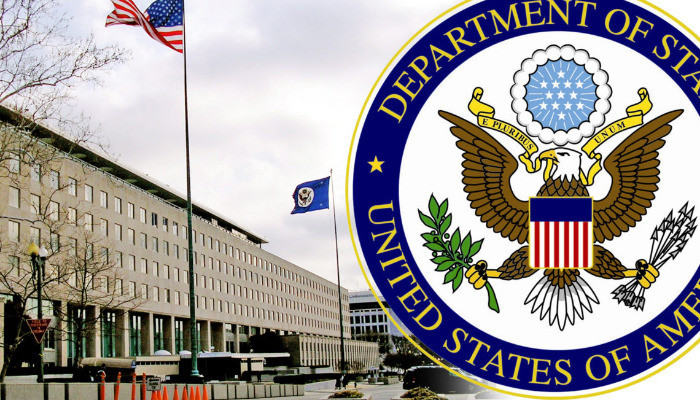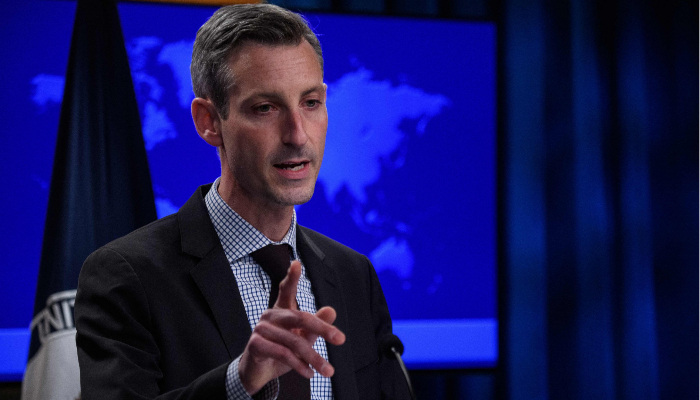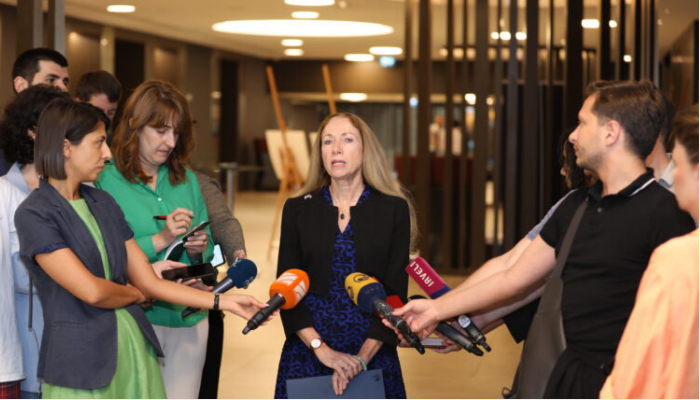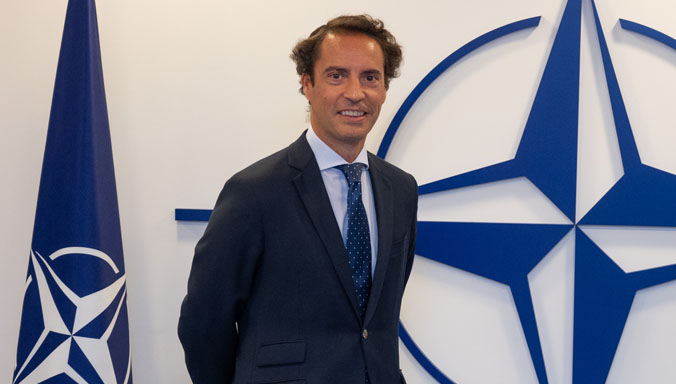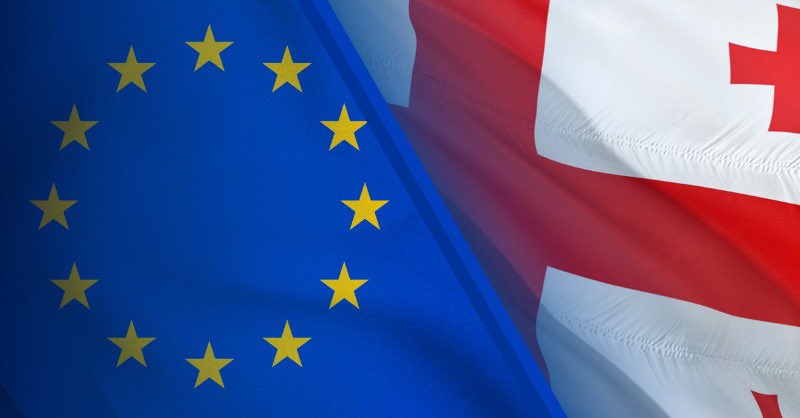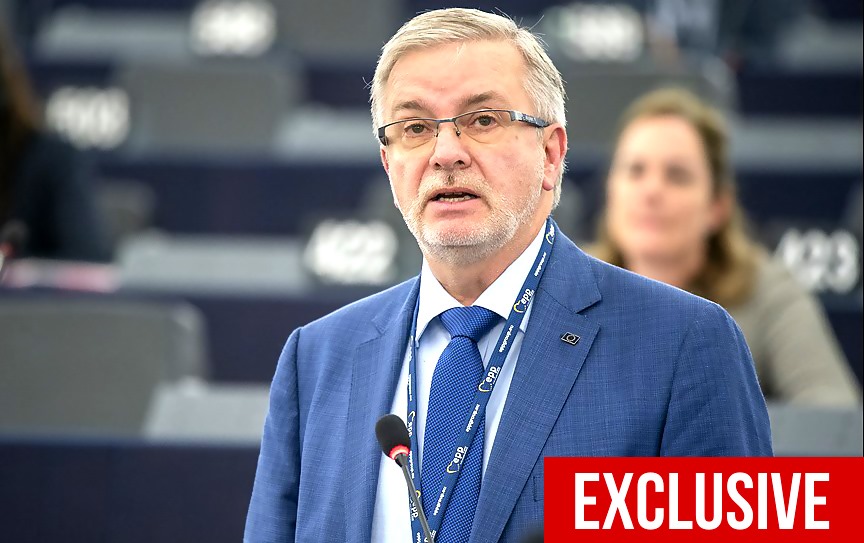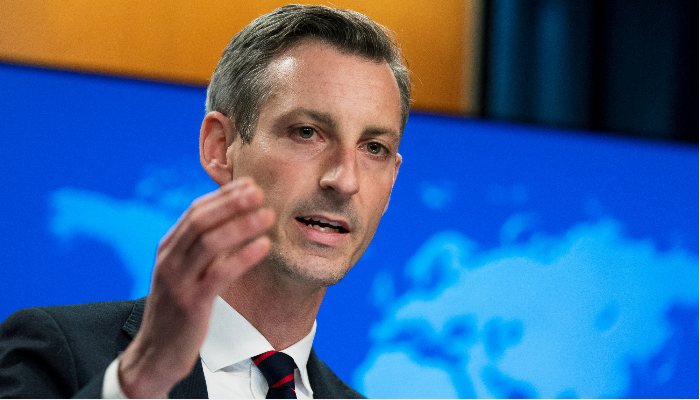Politics
US assistance goes toward improving the quality of life for Georgians, the State Department says
The American people have stood in solidarity with the people of Georgia and their desire to be a free and sovereign country within its internationally recognized borders, a State Department spokesperson told Europetime. The State Department mentioned that US assistance goes toward improving the quality of life for Georgians. From the beginning, the American people have stood in solidarity with the people of Georgia and their desire to be a free and sovereign country within its internationally recognized borders. Over the last 30 years, we have become strategic partners, working together toward our shared vision of Georgia, fully integrated into the Euro-Atlantic family of nations and part of a Europe whole, free, and at peace. The United States’ assistance funds have gone to training tens of thousands Georgian soldiers and sending thousands more to the United States for cultural and education exchanges. We have helped promote economic growth, the rule of law, and democratic governance, among many other initiatives. We are open with the Georgian government about the need to strengthen democratic institutions and processes, the rule of law, and human rights for all. The democratic backsliding we have all observed over the last several years is taking Georgia away from its stated goal of Euro-Atlantic integration, but even more importantly, weakening its own democracy. Our assistance goes to improve the quality of life of Georgians. We listen to the people of Georgia to determine where our assistance goes. We work with the government but also work with the people to reach all corners of the country, to help and support the people in realizing their dreams. We will continue to partner with the people of Georgia as they pursue a democratic, prosperous, peaceful, and Euro-Atlantic future and we urge the Georgian government to implement the necessary reforms to acquire EU candidate status; we stand ready to assist the government in doing so, a State Department spokesperson told Europetime. In addition, The State Department comments on starting a one-year course to help Georgia fight cybercrime. The first course of the Global Cyber Forensics Advisor (GCFA)/International Computer Hacking and Intellectual Property (ICHIP) Attorney Advisor’s Phased Capacity Building Program for Georgian law enforcement professionals began November 3-4. This is the first phase in the nearly year-long forensic certification process and the course has been introduced to the relevant agencies in Georgia. Although retaining resources to effectively investigate and prosecute cybercrime is a challenge, the various ministries and agencies involved in fighting cybercrime in Georgia are committed. Students who successfully complete what is expected to be a year-long course will become certified forensic examiners and will be required to train additional law enforcement with Department of Justice Office of Overseas Prosecutorial Development and Training (OPDAT) support, a State Department spokesperson told Europetime. As for the fight against disinformation, a State Department spokesperson says that the United States stands firmly against Russia’s aggression and attempts to spread its malign influence throughout the world, including Eastern Europe, Central Asia, and the South Caucasus. The State Department supports dozens of programs in foreign countries around the world focused on building societal resilience to disinformation, including training on investigative journalism, fact-checking, media literacy, and digital forensics. Additionally, the Department’s data-driven analysis and research have produced publicly released reports exposing foreign disinformation tools and techniques. The State Department's Global Engagement Center (GEC) is countering Russia’s disinformation threat by driving greater international understanding, sharing best practices, and publicly exposing examples of Russia’s propaganda ecosystem and use of disinformation among our allies.
Ambassador John Sullivan: We will await what the Russian Government’s reaction and then I would expect that there would be a phone conversation, or perhaps a meeting
What are the next steps diplomatically? Secretary Blinken said he expects to speak to Foreign Minister Lavrov in the coming days and is ready to discuss new steps. What should be these steps? The question of the Europe Time was answered by John J. Sullivan, U.S. Ambassador to the Russian Federation. „Well, we will await the Russian Government’s response to the written document that I delivered on Wednesday. The Russian Government also received from NATO a written response from NATO to the draft treaty that Russia presented in mid-December through us, through the United States when Assistant Secretary Donfried and I met with Deputy Foreign Minister Ryabkov. So we will await what the Russian Government’s reaction and assessment is to our written responses, and then as Secretary Blinken noted, I would expect that there would be a discussion, a phone conversation, or perhaps a meeting – I don’t know; that hasn’t been agreed to. The Secretary, Secretary Blinken, has used both formats to communicate with the foreign minister, many phone calls and a number of meetings over the last year. So I wouldn’t be surprised if that happened in relatively short order, but that depends on the Russian Government, its response to the documents that the United States and NATO submitted and when they would like to resume discussions. We certainly hope that they will do so. As I said at the outset, our preferred path is diplomacy and we believe the document that we submitted on Wednesday lays out a path to diplomacy and a de-escalation of this situation“, - Ambassador John J. Sullivan said.
The EU strongly condemns the visit of Alexander Lukashenko to the Georgian breakaway region of Abkhazia
The EU strongly condemns the visit of Alexander Lukashenko to the Georgian breakaway region of Abkhazia. EEAS Spokesperson Peter Stano comments on Lukashenko’s visit to Georgian breakaway region of Abkhazia. „Apart from the fact, that Lukashenko lacks any legitimacy to act as a head of State, this visit was undertaken without the consent of the government of Georgia, which is the only legitimate authority over the region of Abkhazia. This visit violates Georgia’s sovereignty and territorial integrity and constitutes a blatant violation of international law. The EU reaffirms its steadfast support for Georgia’s territorial integrity and sovereignty within its internationally recognised borders“.
State Department: Russia must withdraw its forces to pre-conflict positions and reverse its recognition of Georgia’s Abkhazia and South Ossetia regions
Russia must withdraw its forces to pre-conflict positions and reverse its recognition of Georgia’s Abkhazia and South Ossetia regions, US State Department spokesperson Ned Price stated in response to a question about Alexander Lukashenko's arrival to occupied Abkhazia. „Well, as you know, we remain steadfast in our support for Georgia and for its territorial integrity within its internationally recognized borders. We believe that Russia must be held accountable for the commitments it made under the 2008 ceasefire. Russia must withdraw its forces to pre-conflict positions and reverse its recognition of Georgia’s Abkhazia and South Ossetia regions. The Georgian ministry of foreign affairs did, as you know, release a statement today condemning the visit of Alexander Lukashenka, condemned his visit to Abkhazia, and we’d refer you to the Georgian Government for additional details“, - Ned Price stated. A reminder that the President of Belarus, Alexander Lukashenko, arrived in occupied Abkhazia, where he met with the so-called president, Aslan Bzhania, and said that he wants not only to build a "bridge of friendship" but also "very serious relations" with Abkhazia.
Javier Colomina's visit has been an opportunity to restate NATO’s support for Georgia’s territorial integrity, a NATO official says
NATO Secretary General’s Special Representative for the Caucasus and Central Asia, Javier Colomina visits Georgia. According to a NATO official speaking to Europetime, this week, the NATO Secretary General's Special Representative for the Caucasus and Central Asia, Javier Colomina, has been in Georgia, a highly valued partner of the Alliance. In addition, Mr. Colomina has been holding political consultations with high-level government officials, with members of the opposition, and with civil society. „He has also visited the Administrative Boundary Line. The visit has been an opportunity to restate NATO’s support for Georgia’s territorial integrity, sovereignty, and independence—within internationally recognized borders—as well as its membership aspiration, and to discuss the implementation of the practical measures of support for Georgia agreed at the NATO Summit in Madrid this past June“, - a NATO official says. At the Madrid Summit, NATO leaders agreed to deepen relationships with some of NATO’s closest partners, which joined the summit, among them Georgia. The allies endorsed the set of measures. These tailored support measures are the expression of NATO’s strong political support for Georgia, its sovereignty and territorial integrity and NATO’s commitment to the Bucharest Summit decisions on Georgia’s eventual membership. Measures in the tailored support package step up both political and practical support for Georgia. Javier Colomina: We are currently discussing what the tailored support should entail for Georgia and we expect them to be adopted at the Madrid SummitThis new package is designed to build Georgia’s capabilities and strengthen its resilience. These include Georgia’s increasing participation in NATO’s cyber exercises, strengthening security communications, and helping to develop critical infrastructure. „We will continue to work on the Substantial NATO-Georgia Package (SNGP), which remains the main framework for our practical support for Georgia, including the issues of air defence, intelligence, crisis management and cyber defence. We will also be looking at adding a couple of new areas to the package. We will increase the frequency of our exercises and try to conduct them in two years instead of three. We will also see further synergies with other international organizations, delivering support to Georgia, including the European Union.NATO also plans to provide additional personnel to this office, and we also have structures like Joint Training and Evaluation Center in Krtsanisi, which can be also further strengthened to provide additional support to Georgia. In the months ahead, our staff will be working closely with our Georgian counterparts to translate the measures decided in Madrid into a more detailed plan with the objectives and timelines“, - Alexander Vinnikov, Head of the NATO Liaison Office in Georgia, said this about the decisions made at the NATO Madrid Summit.in the Strategic Concept, which was endorsed, the security of aspirant countries, including Georgia, is intertwined with the security of NATO allies. The Strategic Concept also reconfirms NATO’s commitment to its open-door policy and the decisions taken at the Bucharest Summit and subsequent summits.
Georgia receives $11.5 million in equipment from the US
According to the US Embassy in Georgia, 26 tons of security assistance were handed over to the Defense Forces of Georgia. „Today we delivered 26 tons of security assistance to enhance the defensive capabilities of Georgian Defense Forces. This $11.5 million in equipment, is just one way the U.S. supports our strategic partnership with Georgia“, - the statement reads.
Allies have agreed to step up assistance to partners affected by Russian threats. Georgia and NATO are currently discussing what these tailored support measures should entail
In light of the unprovoked Russian invasion of Ukraine, Allies have agreed to step up assistance to partners affected by Russian threats and interference. This should help to resist Russian malign influence and strengthen their resilience. This applies specifically also to Georgia, which is one of NATO’s closest partners and has been subject to Russian hybrid threats and pressure since many years. According to a NATO official speaking to Europetime, Georgia and NATO are currently discussing at working level what these tailored support measures should entail. „With respect to the Informal Meeting of NATO Ministers of Foreign Affairs in Berlin on 14 and 15 May, the Foreign Ministers of Finland and Sweden have been invited to participate in a working session with NATO Allies on 14 May. The ministerial meetings on 15 May will be for Allies only. The current security environment makes NATO’s partnership with Georgia even stronger and closer. This is reflected by Defence Minister Burchuladze’s participation in the NATO defence ministerial meetings held this past February and March, by Foreign Minister Ilia Darchiashvili’s participation in the recent meeting of NATO Foreign Ministers this past April, and by the NATO Secretary General Special Representative for the Caucasus and Central Asia Javier Colomina’s second official trip to the South Caucasus a few weeks ago. We also maintain a strong level of practical cooperation, with the third NATO-Georgia Joint Exercise last March, and many other ongoing activities under the umbrella of the Substantial NATO-Georgia Package. In light of the unprovoked Russian invasion of Ukraine, Allies have agreed to step up assistance to partners affected by Russian threats and interference. This should help to resist Russian malign influence and strengthen their resilience. This applies specifically also to Georgia, which is one of NATO’s closest partners and has been subject to Russian hybrid threats and pressure since many years. Georgia and NATO are currently discussing at working level what these tailored support measures should entail“, - a NATO official told Europetime. A Nato official says NATO highly values Georgia’s long-standing contributions to Euro-Atlantic security An official says Javier Colomina’s ongoing visit to Georgia is part of regular consultations held by NATO officials with their Georgian counterparts
NATO: LANDCOM officers' visit to Georgia concluded with the signature of a formal agreement by both parties
LANDCOM officers conducted an Operational Capabilities Concept (OCC) Advisory Visit (AV) in Georgia (GEO) for their upcoming NATO Led Evaluation, Level 2 (NEL2) happening now. This visit is part of a robust and long standing relationship between LANDCOM and Georgia Land Forces. According to a NATO official speaking to Europetime, NATO Land Component Command (LANDCOM) provided three officers to conduct an advisory visit to Georgia and the visit concluded with the signature of a formal agreement by both parties. NATO Land Component Command (LANDCOM) provided 3 officers to conduct an advisory visit to Georgia, in preparation for the upcoming second level of the NATO Led Evaluation process (called NEL2) aimed at determining the level of operational capability of a light infantry company from Georgia, which is also listed for NATO's Response Force. The visit occurred from 22 to 26 August 2022. It featured a series of briefings and meetings - including with the Georgian Deputy Chief of Defence - and activities. The visit concluded with the signature of a formal agreement by both parties over a set of Performance Measures against which the second phase of the mentioned evaluation process will be based“, - NATO official said. According to NATO Georgia is a prioritised NATO partner with an infantry company listed for NATO’s Response Forces (NRF).
The EU underlined that Georgia’s European path is merit-based
On 6 September 2022, the European Union and Georgia held the 7th meeting of the EU-Georgia Association Council in Brussels. The Association Council highlighted the historic importance of the decision of the European Council of 23 June 2022 to recognise the European perspective to Georgia. The participants acknowledged that the European Council expressed readiness to grant candidate status once the priorities specified in the Commission’s opinion have been addressed. The future of Georgia and their citizens lies within the European Union. In this context, the EU welcomed that the work had started in the Georgian Parliament and encouraged the ruling party to engage in an inclusive process with participation of representatives from the civil society and parliamentary opposition groups. The EU called on Georgia’s political forces to unite, work together and engage to address these priorities as a matter of priority. The EU underlined that Georgia’s European path is merit-based. The EU is ready to use all instruments to support it. The Association Council welcomed the adoption of the revised EU-Georgia Association Agenda for the period 2021-2027. The document establishes a set of jointly agreed priorities towards further implementation of the Association Agreement, including the Deep and Comprehensive Free Trade Area (DCFTA). The EU and Georgia reaffirmed their continued commitment to bringing tangible benefits to the lives of Georgian citizens across key areas of cooperation. The EU will support Georgia in implementing the agreed objectives and priorities. The Association Council reiterated its commitment to further strengthen EU-Georgia relations, including through fully exploiting the potential of the Association Agreement including the DCFTA. The Association Council recalled that the effective implementation of the Association Agreement and its DCFTA, linked to the broader process of regulatory approximation and related necessary reforms, contributes to establishing conditions for enhanced economic and trade relations with the EU leading to Georgia’s further gradual economic integration in the European Union Internal Market, as envisaged in the Association Agreement. The EU acknowledged that Georgia has carried out a number of challenging reforms and successfully approximated its legislation with the EU acquis in many sectors. The EU expressed, however, important concerns over the lack of substantial progress and negative developments in some key areas in 2021. The EU encouraged Georgia to redouble its efforts to further consolidate democracy and reduce the political polarisation, to strengthen the rule of law, the independence, integrity and accountability of the judiciary and the fight against corruption. The EU also called upon Georgia to further enhance the respect of human rights and fundamental freedoms, including gender equality and ensure equal treatment between women and men, as well as persons belonging to minorities, regardless of religion or belief, ethnic or national origins, race, language, gender, sexual orientation, gender identity, ability or other ground in social, political and economic life and stressed the importance of media freedom and civil society engagement. Democracy, rule of law and human rights are essential priorities for Georgia to advance on its European path. The Association Council welcomed the progress on the preparations of the Human Rights Strategy of Georgia for 2022-2030. The EU recalled that the upcoming discussions in the Parliament create a good opportunity for inclusive approach and due consultations with all key actors. The Association Council recalled that upholding the highest standards of judicial independence, the right to a fair trial and the rule of law are essential commitments of Georgia under the EU-Georgia Association Agreement. The EU urged Georgia to effectively ensure the independence, integrity and accountability of judicial and prosecutorial bodies, and adopt and implement an ambitious judicial reform strategy post-2021 based on a broad, inclusive and cross-party process, in line with European standards and the recommendations of the Venice Commission. The EU underlined the need to ensure effective and efficient investigations of violence against media professionals in the context of the 5 July 2021 Tbilisi Pride March and strengthen preventive measures. The EU urged Georgia to bring all those responsible to justice, while noting steps taken so far. The EU welcomed that the events related to Tbilisi pride in 2022 proceeded in a peaceful atmosphere. The EU underlined its firm support for Georgia's sovereignty and territorial integrity within its internationally recognised borders. The Association Council reaffirmed its strong commitment to conflict resolution in Georgia through a comprehensive approach, including the EU policy of non-recognition and engagement, and with due attention to the women, peace and security agenda. The Association Council stressed the critical importance of the Geneva International Discussions and Incident Prevention and Response Mechanisms (IPRMs) for addressing and resolving the challenges stemming from the conflict between Russia and Georgia in August 2008. The EU and Georgia deplored the continued implementation of so-called "treaties" on integration signed between the Russian Federation and the Georgian regions of Abkhazia and Tskhinvali region/South Ossetia, and other illegal activities of Russia in these regions, in violation of Georgia's sovereignty and territorial integrity, including the military build-up and installation of barbed wire fences along the administrative boundary line. The Association Council expressed concerns about the dire human rights situation in the Georgian regions of Abkhazia and Tskhinvali region/South Ossetia, especially with regard to arbitrary detentions, restrictions to the right to freedom of movement, violation of property rights and education in mother tongue, ethnic discrimination of Georgians, and impunity in the cases of deprivation of life of Georgian citizens. The Association Council stressed the need for unhindered access by international humanitarian and human rights mechanisms of the relevant international organisations, as well as the EU Monitoring Mission (EUMM), to both of these Georgian regions. The Association Council stressed the importance of support to people-to-people contacts and confidence building measures across the divides. The Association Council recalled the European Court of Human Rights Judgement in the case concerning the armed conflict between Georgia and Russia in August 2008 and its consequences, which ruled that after 12 August 2008 the Russian Federation, exercising effective control over the Georgian regions of Abkhazia and Tskhinvali region/South Ossetia, violated several provisions of the European Convention of Human Rights. The Association Council reiterated the obligation for the Russian Federation to fulfil the EU-mediated 12 August 2008 Ceasefire Agreement and reaffirmed its expectation that the Russian Federation should withdraw its military forces from Georgia’s territory and allow the establishment of international security mechanisms on the ground. The Council stressed the obligation to ensure safe and dignified return of internally displaced persons and refugees to their homes. The Association Council condemned in the strongest possible terms the unprovoked and unjustified Russian war of aggression against Ukraine and agreed to continue cooperating in the international fora to hold Russia accountable. Georgia recalled its commitment to continue doing its utmost to prevent sanctions circumvention. The EU and Georgia also committed to continue working closely on further strengthening the overall resilience of Georgia, in line with the objectives of EU-Georgia security cooperation. The EU reconfirmed its support to Georgia in countering hybrid and cyber threats as well as its continued engagement in strategic communication and countering disinformation. In this context, the EU expressed concern over the increased anti-Western disinformation and rhetoric which risks damaging Georgia’s European path. The path which is supported by the government of Georgia and a vast majority of the Georgian people. The EU recognised Georgia as a key partner in the region and acknowledged the importance of EU-Georgia cooperation in the field of foreign and security policy. The EU welcomed Georgia’s continued participation in civil and military crisis management operations under the Common Security and Defence Policy, namely in the EU military training mission in the Central African Republic and the EU Training Mission in Mali. The Association Council welcomed successful recovery from the economic crisis caused by COVID-19, with GDP growth in Georgia at 10.4% in 2021, and this positive trend continued during the first months of 2022. The Association Council recalled the EU’s contribution to Georgia’s macroeconomic stability and overall resilience in 2020-2021. The Association Council welcomed that the EU remained Georgia’s largest trading partner and that Georgia’s exports to the EU were growing. The Association Council underlined the common ambition to increase EU-Georgia trade flows inter alia through further alleviation of obstacles to trade in a targeted way. The Association Council welcomed that Georgia had fulfilled the main requirements for phase I of the Public Procurement Roadmap, including the establishment of a new dispute resolution body, which led to increased market access. The Association Council underlined the importance and mutual interest in enhancing the connectivity between EU and Georgia in key areas such as transport, energy and digital sectors, recalling the potential of the agreed flagship initiatives under the Economic and Investment Plan for the Eastern Partnership. The Association Council reiterated Georgia's key role as a partner for European energy security, and notably its transit role for Caspian hydrocarbon resources via the Southern Gas Corridor. In this context, the EU reaffirmed the importance of the Black Sea. The EU welcomed Georgia’s interest in joining the Single Euro Payments Area (SEPA), and expressed willingness to support Georgia’s efforts in meeting the criteria. EU also welcomed Georgia’s interest in participating in the EU Single Market Programme. The Association Council welcomed Georgia’s association to the EU Customs and Fiscalis programmes. The EU welcomed Georgia’s actions to address the European Commission’s recommendations under the visa suspension mechanism and encouraged continued and sustained efforts, including to address the issue of unfounded asylum applications and to fight organised crime. The EU welcomed the implementation of the amendments to the Law of Georgia on “Rules for Georgian Citizens Exiting and Entering Georgia”. The Association Council stressed the importance of Eastern Partnership as a regional format and underlined the need to adapt it to the evolving reality in the region. The EU appreciated Georgia’s strong involvement in Erasmus+, Horizon Europe and the Creative Europe programme. The meeting was co-chaired by High Representative for Foreign Affairs and Security Policy, Josep Borrell, and Prime Minister of Georgia, Irakli Garibashvili.
The President of Kazakhstan is taking risks with the West, Matthew Bryza says
Former Deputy Assistant Secretary of State for European and Eurasian Affairs Matthew Bryza, speaking to Europe Time, suggests that Kazakhstan is embroiled in a power struggle. The upheaval in Kazakhstan, according to Matthew Bryza, is a challenge for Kazakhstan, not the West. "President Tokaev is trying to claim that there are some external forces, some terrorists. I think that this is absolute baloney. There is zero evidence of that. And the fact that Tokaev accuses the former head of security services, Karim Masimov, is absurd. This shows me that President Tokaev is desperate. He realizes he made a huge mistake by removing Nazarbaev from his constitutionally guaranteed position. So, he violated the Constitution. When he fired Masimov, he lost all support from the security services. "It is simple to answer that Tokaev is trying to replace the leadership that appointed him as president, and it would have a regional aspect if unrest continues and Tokaev keeps trying to destroy the Nazarbayev regime," Matthew Bryza said. In terms of Russia's role, Bryza believes President Putin did not want to get involved. "There are a few ways the US and Russia share a common interest in central Asia and the South Caucasus. One is that when it comes to Kazakhstan, both Moscow and Washington want stability; they do not want protest, which spins out of control. It is also important that US investment in the energy sector in Kazakhstan continues. When there was a chance that Tokarev could be overthrown by protests in the streets, I think Putin decided: We have no choice, we have to send troops, and the worst situation for Putin would be if the protest continues and Russian troops get involved in fighting, then Russia will be the enemy of Kazakhstan, like in Ukraine. "As a result, Putin does not want Russian soldiers to be involved," Matthew Bryza said. According to him, this is a challenge for Kazakhstan and not for the West. There is not much at stake for the West. The US pulled out of Afghanistan in a terrible way. The US does not need oil or gas in Kazakhstan. Bryza said that Kazakhstan is under Russia's influence. The United States is the largest producer of natural gas in the world, compared to Russia and Saudi Arabia. However, Chevron has made a big investment, and, of course, the United States wants this company to do well, Matthew Bryza said. Is he an Authoritarian leader? Bryza also discusses this issue. "He has become one. But I would not have guessed that he would take this path. I had the honor of meeting him many times when he was a foreign minister or deputy minister, and he was always a gentle and highly educated man. I am surprised he became the de facto autochtonarian leader. If a leader of any country issues an order to kill protesters, you have become an authoritarian leader, and I am shocked and disappointed. He has chosen Moscow. I believe his interactions with Putin will be positive. As with the West, he risks being seen as a Central Asian authoritarian leader who used to be on the right path. But now he has chosen to confront his own people. He risks being the target of sanctions. Anger in Kazakhstan's society "I have spent so many years in Kazakhstan that I visited Zhanaozen as part of my business life. There has been a lot of anger in Kazakhstan's society for decades. Especially in the western area of Kazakhstan, Zhanaozen, because that is where the normal wealth is generated and the wealth is taken out of the region, the people who live there do not live a great life. They do not have a lot of money, and they suffer from a very serious health problem because of the bad treatment of the environment caused by oil production. The increase in the crisis of LPG was like the spark that lit that little fire in Zhanaozen and brought those protests to life. It is surprising how quickly the protests spread to other cities in Actobe, Actau, which is near Zhanaozen, Taraz, and then really surprising to Almati. "Almati is a very prosperous city, and it is really unusual that there would be protests there," Matthew Bryza said.
The United States is working with NATO allies to support Georgia’s security and defense modernization efforts
EXCLUSIVE According to a State Department spokesperson U.S. security assistance to Georgia has focused on capabilities that improve defense modernization. `Georgia is a highly valued U.S. and NATO partner. The United States strongly supports Georgia’s NATO aspirations and is working with NATO Allies to support its security and defense modernization efforts. The United States also held Bilateral Defense Consultations with Georgia on May 20. „The Georgia Defense and Deterrence Enhancement Initiative (GDDEI) is a formal bilateral effort by the United States and Georgia to continue their strong military-to-military relationship and builds upon the success of the Georgia Defense Readiness Program (GDRP). GDDEI builds on the progress achieved under GDRP by enhancing deterrence and territorial defense capabilities, fostering interoperability with NATO, and enabling institutional reform and modernization through organizational change management“, - a State Department spokesperson said. U.S. Department of State: Security assistance to Georgia has focused on capabilities that enhance defense modernization and reforms
Ambassador Degnan: Things like Gavrilov’s night, things like broken political promises and anti-democratic actions - that’s where this depolarization came from, not from Western partners
„I think it’s important for Georgians to remember, to look back three years, four years, and remember where this depolarization came from. Things like Gavrilov’s night, things like broken political promises and anti-democratic actions. That’s where this depolarization came from, not from Western partners“, - US Ambassador to Georgia Kelly Degnan stated. The U.S. ambassador emphasized that the accusations made against the U.S. and others "are reckless conspiracy theories that have no basis. Ambassador Degnan: Let me start by saying that for decades we have been working with Georgia on judicial reform, and there has been some very important progress over the course of the last decade in particular, where we’ve seen some good reform efforts. Everyone knows that there is more work to be done there. That has never been an issue of debate, so it’s a little puzzling why there is such resistance now to doing the work that everybody has been saying for a long time: it needs to continue to improve Georgia’s judiciary, to make sure that it truly is independent, impartial, autonomous, and responsive to the public. In this case, it is baffling to me why there is a question about the kind of consultation that has been ongoing, not just with the United States, but with other legal experts, domestic and international, for decades on judicial reform. That consultative process has resulted in improvements in Georgia’s judiciary. There is more to be done, and that includes commitments that the Georgia’s political leaders across the political spectrum have already agreed to multiple times over multiple years: that these kinds of improvements still need to be made. There are recommendations from the Venice Commission and ODIHR. These are international legal experts who provide this kind of advice globally to countries like Georgia and other countries as to how to improve their judicial system. Many of them have been fulfilled. Many of them have not. These are the same steps. These are the same reforms that Georgia’s political leaders have agreed to do, both in the April 19th agreement, after the April 19th agreement, and before the April 19th agreement. Some of these are now being discussed in the judicial working groups that Parliament is hosting, and that the opposition and civil society have also contributed to this group. Obviously, the United States has also helped Georgia for many years in building its democratic institutions. That includes a diverse Parliament that represents the Georgian public. I’m not sure what this group (the quartet) represents. I’m not sure who they represent, and I’m not sure how different they are from the ruling party that they say they left. What I can say is that the accusations that they most recently made against the United States and others are reckless conspiracy theories that have no basis. In fact, it’s very important to keep in mind that the United States works with all political parties across the political spectrum. We meet with Georgians from across the political spectrum, and we have for over 30 years. This is how we know how we can better support Georgia in trying to help Georgia develop its democratic institutions, develop its economy, ensure that it is more secure and stable as a democracy. This is the work that we’ve been doing with our Georgian partners for over 30 years and what we will continue to do in the coming years. I would say that any accusations that we are responsible in any way for the polarization that exists here is an attempt to shift the blame from those who know they are responsible to Western partners, who have done nothing but tried to help Georgia for 30 years along its European path. That is all we have done. I can say from the two and a half years that I’ve been here. Almost every single day, I have worked to try and bring Georgia’s political leaders together to try and bridge the deep polarization that existed long before I got here. And I think it’s important for Georgians to remember, to look back three years, four years, and remember where this depolarization came from. Things like Gavrilov’s night, things like broken political promises and anti-democratic actions. That’s where this depolarization came from, not from Western partners, who again, have only been trying to help Georgia bridge this deep polarization so that the Parliament and other institutions can focus on what’s really important to Georgians: jobs, high prices, good education, better public health. That’s what Parliament needs to be focusing on, and now, in particular, the 12 recommendations that the European Commission has put forward, including pledges that Georgia’s political leaders have made before, and said they were going to do. This is the time to get that done. This is the time to really focus, in an inclusive manner, together, to put aside differences and focus on getting that candidate status.
Blinken says Russia must reverse its „recognition“ of Abkhazia and South Ossetia
U.S. Secretary of State Antony Blinken on the anniversary of the Russian attack on Georgia in August 2008 issued a statement condemning Russian aggression and emphasizing solidarity with the Georgian and Ukrainian peoples who continue to suffer from the occupation. The statement has been posted on the official website of the Department of State. “Fourteen years ago today, Russia invaded the sovereign nation of Georgia. As we have done since 2008, we remember those killed and injured by Russian forces. For decades, the citizens of Georgia in Abkhazia and South Ossetia have lived under Russian occupation and tens of thousands have been displaced, persecuted, and impoverished. Lives and livelihoods have been taken from them. This year, Russia’s unprovoked further invasion of Ukraine underscores the need for the people of Georgia and Ukraine to stand together in solidarity. The people of Georgia know all too well how Russia’s aggressive actions, including disinformation, so-called “borderization,” and mass displacement cause untold hardships and destruction. Russia must be accountable to the commitments it made under the 2008 ceasefire – withdrawing its forces to pre-conflict positions and allowing unfettered access for the delivery of humanitarian assistance. It also must reverse its `recognition` of Georgia’s Abkhazia and South Ossetia regions. This is essential for hundreds of thousands of internally displaced persons to be able to return to their homes safely and with dignity. We remain steadfast in our support for the people of Georgia as they seek to protect their sovereignty and territorial integrity and find a peaceful solution to the conflict“, - Blinken said.
U.S. Department of State: Security assistance to Georgia has focused on capabilities that enhance defense modernization and reforms
Pending Congressional clearance, the Department of State intends to provide $35 million in new FY 2022 Foreign Military Financing (FMF). This is the same amount of bilateral FMF Georgia received in FY 2021. As a State Department spokesperson told Europetime, U.S. security assistance to Georgia has focused on capabilities that improve defense modernization. `U.S. security assistance to Georgia has focused on capabilities that enhance defense modernization and reforms that 1) provide Georgia increased capabilities and capacity to defend its territory and sovereignty, 2) improve training and professionalization, 3) help Georgian forces to work together more effectively with NATO, 4) strengthen maritime domain awareness, and 5) support Georgian participation in coalition operations (of note, Georgia was the largest non-NATO troop contributor to the Resolute Support Mission in Afghanistan through the 2021 drawdown). These funds will continue to build upon our steadfast security cooperation`, - a State Department spokesperson said. Georgia has received over $400 million in FMF since 1997.
Ned Price: Ambassador Degnan has our full support, disinformation and personal attacks on Ambassador Degnan or her team are not consistent with how partners communicate with one another
„Ambassador Degnan has our full support. Disinformation and personal attacks on Ambassador Degnan or her team are not consistent with how partners communicate with one another“, - US State Department spokesperson Ned Price stated at the briefing. Ned Price noted that European Council extended Georgia a European prospective status, along with a roadmap of reforms that must be implemented for Georgia to achieve full candidate status. „Just one element at the top and then we’ll turn to your questions. As I think you all know, the European Council extended Georgia a European prospective status, along with a roadmap of reforms that must be implemented for Georgia to achieve full candidate status. We know the people of Georgia are overwhelmingly in favor of joining the EU, and we, of course, support those aspirations. The rhetoric from some Georgian officials recently, however, seems intended to distract Georgia’s citizens from that goal. Ambassador Degnan and her team at our embassy in Tbilisi are committed to working with the people of Georgia in support of their Euro-Atlantic aspirations. Ambassador Degnan has our full support. Disinformation and personal attacks on Ambassador Degnan or her team are not consistent with how partners communicate with one another, and we will continue to focus on supporting our shared goals. We have worked shoulder to shoulder for 30 years on democratic reforms, economic development, and security cooperation. This remains unchanged. Today the United States is working with our allies and partners to bring an end to President Putin’s war in Ukraine as quickly as possible and to secure a peaceful future for the entire region. The United States supports Georgia’s sovereignty and its territorial integrity within its internationally recognized borders, and we continue to support peaceful efforts to end Russia’s occupation of 20 percent of Georgia’s territory." - Ned Price, U.S. Department of State Spokesperson said.
Ambassador Degnan says war-dragging narrative FSB disinformation
U.S. Ambassador to Georgia Kelly Degnan has said the „insidious narrative“ in Georgia that the United States dragging the country into Russia’s war against Ukraine, „seems straight out of an FSB disinformation book“. In her remarks to reporters today at Tbilisi Pride’s Regional LGBTQI+ Conference, Ambassador Degnan stressed that „the United States does not want to see this war expand in any way. The United States is doing everything we can to stop this war as soon as possible“. Ambassador Degnan: Georgia is a very strong partner of NATO, and I think that’s shown by the high-level delegation that attended the Madrid summit. The summit was a display of how strong the NATO Alliance’s unity is in the face of Russia’s brutal war against Ukraine. It was a reaffirmation of the purpose of the NATO Alliance, which is a defensive Alliance that stands to promote peace and stability in Europe and beyond. I think that the summit was also an opportunity for Georgia to regalvanize around the steps that Georgia needs to make. Many of them are the very same kinds of reforms that are being called for in Georgia’s European Union candidate status. So, work that’s done to promote the European Union membership candidate status will also benefit Georgia’s NATO membership process, because these are the same kinds of political and democratic reforms. It’s important to remember: NATO is a political-military Alliance. That means it has military standards that must be met as well as political standards that must be met. And the United States and its allies stand ready to assist Georgia to make progress toward that membership. While we’re on the subject of defense, I’d like to respond to this insidious narrative that seems to continue. It seems straight out of an FSB disinformation book, but let me be very clear. The United States is not trying to drag Georgia into Russia’s war against Ukraine. The United States does not want to see this war expand in any way. The United States is doing everything we can to stop this war as soon as possible. It was Putin who launched this aggressive and brutal war against Ukraine, and it is Putin who can stop this war. It’s the United States, Europe, the friends of Georgia, who over the past 30 years, have done everything we can to help Georgia along its path to Euro-Atlantic integration. We will continue to do that. I think it’s really important for Georgians to remember that it is Russia that occupies 20% of your territory. It is Russia that tried to kill your language. It’s Russia that desecrated your churches by using them as stables for animals. If there’s any question about what Russia’s friendship for Georgia means, all you have to do is look at the Administrative Boundary Line to see your friends are in the United States and in Europe. And that is the path to peace, stability, and prosperity for Georgia“.
Javier Colomina: We are currently discussing what the tailored support should entail for Georgia and we expect them to be adopted at the Madrid Summit
NATO Secretary General’s Special Representative for the Caucasus and Central Asia, Deputy Assistant Secretary General for Political Affairs and Security Policy, Javier Colomina, answered questions by Europetime about the NATO Summit, NATO-Georgia relations, the Russian war in Ukraine, the accession process of Finland and Sweden, as well as other topical issues. ET: What is your opinion on the implications of Russia’s invasion of Ukraine for NATO? In the long run, how do you view these consequences, and how do you see the alliance's relations with Russia in general? Russia’s aggression against Ukraine represents the gravest threat to Euro-Atlantic security in decades. It has shattered peace in Europe and is causing enormous human suffering and destruction. We see President Putin concentrating his forces in eastern Ukraine after his failed offensive against Kyiv. Russia is now engaged in a war of attrition, with high numbers of casualties on both sides. The Russian military has resorted to indiscriminate levelling of Ukrainian cities. Schools, hospitals, and residential areas have been flattened and the humanitarian conditions in Russian-controlled areas are dire. Furthermore, President Putin’s war is driving up food prices, pushing people into poverty and destabilising entire regions. This is cynical and destructive and the costs are being borne by the world’s most vulnerable people. We call on Russia to immediately end its blockade of Ukrainian ports; and Allies are working hard, also with the United Nations, to find solutions. Against this background, NATO continues to pursue two parallel priorities. First, we continue to support Ukraine. On the other, we are making sure that this war does not escalate further into Allied territory, while we keep protecting one billion of our citizens living in NATO countries. NATO Allies have provided support for Ukraine for many years, including with equipment, financial support, and training for tens of thousands of Ukrainian troops. Allies and partners have already provided Ukraine with billions of dollars’ worth of lethal and non-lethal equipment, as well as humanitarian aid. All of this is making a difference on the battlefield, helping Ukraine to uphold its right of self-defence, which is enshrined in the United Nations Charter. Allies are also providing substantial humanitarian aid, including by hosting millions of refugees. They are now stepping up further, with many types of light and heavy military equipment. Secondly, we reacted to Russia’s invasion of Ukraine with speed and unity, to protect our nations. Over 40,000 troops are now under direct NATO command, backed by major air and naval power. This is to deter further Russian aggression, in other words, aimed not at provoking a conflict, but rather at preventing it and restoring peace. We continue to call on President Putin to stop his war in Ukraine, withdraw his troops and engage in good faith in the diplomatic process. Our relationship with Russia is at its lowest point since the Cold War. We regret this, and it is not of our choosing. Our relationship with Russia was not always like this. The fall of the Berlin Wall ushered a new era of partnership with Russia. For many years, we would discuss our common security in the NATO-Russia Council. We cooperated in areas of common interest, from counter-terrorism to arms control, and we worked closely together in Afghanistan. Russia chose to walk away from this partnership. The war in Ukraine is part of a long pattern of Russia using military force to achieve its political aims, as Georgians are well aware. ET: As for the status of NATO-Georgia relations and implications of Russia’s invasion of Ukraine, what are the fundamental pillars that the Alliance will use to make future decisions? Has anything fundamentally changed? First of all, the current security environment makes NATO’s partnership with Georgia even stronger and closer. We intensified our dialogue in recent months: Foreign Minister Darchiashvili and Defence Minister Burchuladze participated in various meetings with their NATO counterparts; Prime Minister Garibashvili met with the NATO Secretary General last May; and I visited the South Caucasus last April. We also maintain a strong level of practical cooperation, with the third NATO-Georgia Joint Exercise last March, and many other ongoing activities under the umbrella of the Substantial NATO-Georgia Package. Against the backdrop of Russia’s unlawful invasion of Ukraine and of its security implications, including for the Black Sea region, Allies have agreed to step up the scope of practical assistance to Georgia. We are currently discussing what this should entail and I expect that more details will be unveiled at the NATO Summit in Madrid next week. The Georgian government has clearly stated that integration into NATO continues to be a top foreign policy and security objective for the country. This also means that, as I have said at other times, we expect Georgia to redouble its efforts in key reform areas such as the judiciary, media freedom and accountability of the security sector. On our side we stand by our commitments from the 2008 Bucharest Summit on Georgia’s aspirations towards NATO membership. Our support for Georgia’s sovereignty and territorial integrity - within international recognized boundaries - remains unwavering. We also continue to recognize Georgia’s contribution to our shared security. Georgia has been one of the largest contributors to our missions in Afghanistan and played an important role in the evacuation efforts in Summer 2021. Georgia also participates in the NATO Response Force; and it has recently led a NATO-Georgia exercise, which involved around 600 troops. ET: What system or tool may be put in place to provide tailored support to Georgia in the face of heightened threats? How might the Alliance aim to continue its cooperation with Georgia at a new stage, possibly in a new format? As I mentioned before, in light of the unprovoked Russian invasion of Ukraine, Allies have agreed to step up assistance to partners such as Georgia, which is one of NATO’s closest partners and has been subject to Russian hybrid threats and pressure since many years. Rather than establish new tools or systems, we should build on the Substantial NATO-Georgia Package and increase our support to Georgia by in the areas of situational awareness, secure communications, resilience and cyber. We are currently discussing, together with Georgian authorities, what these measures should entail in more detail and we expect them to be adopted at the Madrid Summit. ET: Can Georgia expect any concrete, tangible results from the next summit? What will be the main focus of the summit, and what could you say about Ukraine? We will take important decisions at the NATO Summit in Madrid next week. We will strengthen our deterrence and defence; we will agree to support Ukraine for the long haul; we will agree NATO’s next Strategic Concept, which represents the blueprint for our future adaptation in an age of increased strategic competition with authoritarian powers like China; and we will agree to support further our partners at risk with tailored measures. We will commit to working even more closely with our partners in the Asia-Pacific and other like-minded partners around the world. We will also review progress on burden-sharing, because it is clear we must continue to invest in our defence, and to invest more and better together in NATO. Only North America and Europe, working together in a strong NATO, can keep our one billion people safe in a more dangerous world. The participation by NATO partners will also be a distinctive feature of our Summit in Madrid. President Zelenskyy has been invited to address NATO leaders at the Madrid Summit and Prime Minister Garibashvili will also be invited to participate in one of the sessions, which shows the importance of our partnership. Invitations to participate have also been extended to Finland, Sweden, and the European Union, as well as to our Asia-Pacific partners Australia, Japan, New Zealand, and the Republic of Korea. ET: What are your thoughts on the prospects for Finland and Sweden joining NATO? How do you think Turkey's concerns may be addressed before the Summit? The applications by Finland and Sweden to join our Alliance are historical. As NATO Secretary General, Jens Stoltenberg said, “They send a clear message: aggression does not pay; intimidation does not work; and NATO’s door remains open.” Finland’s and Sweden’s potential accession to NATO would make both countries safer. It would also make NATO stronger, given that both Finland and Sweden are strong democracies and resilient societies, have considerable military capabilities - including substantial reserves and advanced aircraft and naval forces, all able to work together with NATO – and are long-standing contributors to past and current NATO-led missions (in Afghanistan, in Kosovo, and in Iraq), as well as to NATO and Allied exercises. As the NATO Secretary General said: “We are now considering the next steps on Finland and Sweden’s path to join our Alliance; as we do this, we take into account the security interests of all Allies; when an Ally raises concerns, we address them seriously and we find common ground; so we are now working through Türkiye’s serious security concerns, including on terrorism. Türkiye is an important Ally, with a strategic location, playing a key role in the Black Sea, bordering Syria and Iraq, vital for our fight against ISIS. Türkiye is also the NATO Ally that has suffered more terrorist attacks, including at the hands of the PKK. We are now working together, in a constructive spirit, to find a united way forward. All Allies agree that NATO's door is open, that enlargement has been an historic success, and that we must continue to stand together as we face the greatest security crisis in a generation.” Let me add that from a security perspective, Finland and Sweden are in a better place now than they were before they applied. Many Allies have already made clear commitments to Finland and Sweden’s security; and NATO has increased our presence in the Baltic Sea, including with more exercises; for example, Finland and Sweden have been involved in several Allied exercises in recent weeks, including BALTOPS, bringing together 7,500 personnel from 14 Allies – including from Türkiye. This is a clear demonstration of NATO’s commitment to this region.
The European Council recognizes the European perspective of Georgia and is ready to grant candidate status once the outstanding priorities are addressed
The European Council decided to recognize the European perspective of Georgia and is ready to grant candidate status once the outstanding priorities are addressed. „Congratulations to the Georgian people. A historic moment in EU-Georgia relations: Georgia's future lies within the EU“, - the President of the European Council said.
MEP Michael Gahler: Reform is a key issue when it comes to the rule of law and the judiciary
EU-Georgian relations and other issues were the topics of the Europe Time interview with MEP Michael Gahler, Group of the European People's Party (Christian Democrats). „We are open and prepared to support a real reform process. There is an ambition in your country to apply for EU membership that must succeed in line with its development, and I am afraid that recent months have not been very helpful in promoting your case. That is why we appeal to the Georgian partners to assess the situation and seek ways forward in the interest of the country. We are trying to defuse tension and get more constructive and cooperative ways to address issues done in Georgia. We encourage all steps in the right direction. We have undertaken enormous efforts to have the European Council three times in the country and through the Eastern Partnership. It is not usual, but we care. We are concerned, but we are also constructive in our approaches“. As for the association trio countries and their ambition, MEP Michael Gahler welcomes their ambitious agenda but stresses the importance of the reform. „We have a comprehensive framework with Georgia and this is an association agreement and deep and comprehensive free trade area which provides a huge spectrum of integration, cooperation, reform, and the reform is the key issue when it comes to rule of law and the Judiciary. And it is extremely important not only in Georgia but also in other countries in this neighborhood", - MEP Michael Gahler said. As for the EU membership perspective, MEP Michael Gahler mentioned that Article 41 says every European country can become a member, but the approach should be for all those who aspire to membership, to simply work on this huge and comprehensive cooperation agenda. So we are supportive, but all reactions in the wrong directions are not helpful so far last month and the last year's continuing confrontation has not been promoting your case. That is why we, friends of Georgia, are appealing to all stakeholders to get this done together. We are friendly partners“, - MEP Michael Gahler said.
Ned Price: We support the further integration of Ukraine and Moldova and Georgia with their European neighbors
The United States supports the further integration of Ukraine, Moldova and Georgia with their European neighbours, Department of State Spokesperson Ned Price said in a briefing on Tuesday. “We maintain our longstanding commitment to a Europe that is whole, that is free, and that is at peace, and we support the further integration of Ukraine and Moldova and Georgia as well with their European neighbors. For all of these countries, though, these are countries that over the course of now decades have expressed a desire for a closer relationship, closer proximity with the West. The United States has worked with all three of these countries to help them develop their democratic institutions, to help them develop their system of checks and balances; to help them develop their economies that are integrated with Europe and with the West; and we will continue to stand by them going forward”, said Ned Price. The European Commission presented its Opinions on the applications for EU membership submitted by Ukraine, Georgia and the Republic of Moldova as invited by the Council. The European Commission recommended to grant Ukraine and Moldova EU candidate status, while it recommended that Georgia be given the perspective to become a member of the EU, and that candidate status should be granted once a number of priorities have been addressed. The Opinions are based on the Commission’s assessment in light of the three sets of criteria to join the EU agreed by the European Council: political criteria, economic criteria, and the ability of the country to assume the obligations of EU membership (EU acquis). According to a press release from the European Commission, the Opinions also take into account Ukraine, Moldova and Georgia’s efforts in implementing their obligations under the Association Agreements (AA), including the Deep and Comprehensive Free Trade Areas (DCFTA), which cover significant parts of the EU acquis. Ukraine The European Commission has found that Ukraine overall is well advanced in reaching the stability of institutions guaranteeing democracy, the rule of law, human rights and respect for and protection of minorities, and has continued its strong macro-economic record, demonstrating a noteworthy resilience with macroeconomic and financial stability, while needing to continue ambitious structural economic reforms. The country has gradually approximated to substantial elements of the EU acquis in many areas. Moldova The European Commission concludes that the country has a solid foundation in place to reach the stability of institutions guaranteeing democracy, the rule of law, human rights and respect for and protection of minorities; macroeconomic policies have been reasonably sound and progress has been made in strengthening the financial sector and business environment but key economic reforms remain to be undertaken. The country has established a solid basis for further alignment with the EU acquis. Georgia The European Commission assesses that Georgia has a foundation in place to reach the stability of institutions guaranteeing democracy, the rule of law, human rights and respect for and protection of minorities, even if recent developments have undermined the country’s progress; it has achieved a good degree of macroeconomic stability and has a sound record of economic policy and a favourable business environment, but further reforms are needed to improve the functioning of its market economy; overall, Georgia has established a solid basis for further alignment with the EU acquis.


